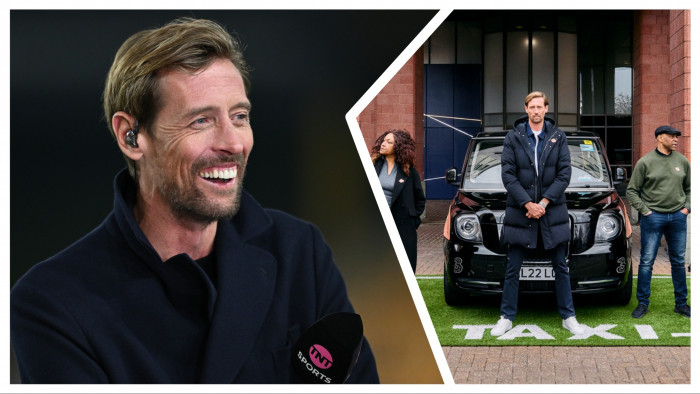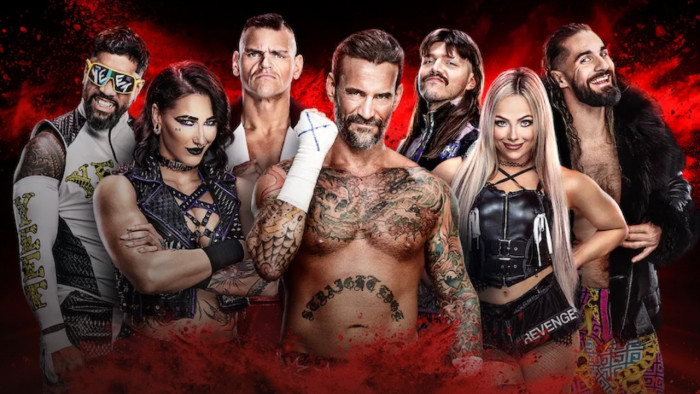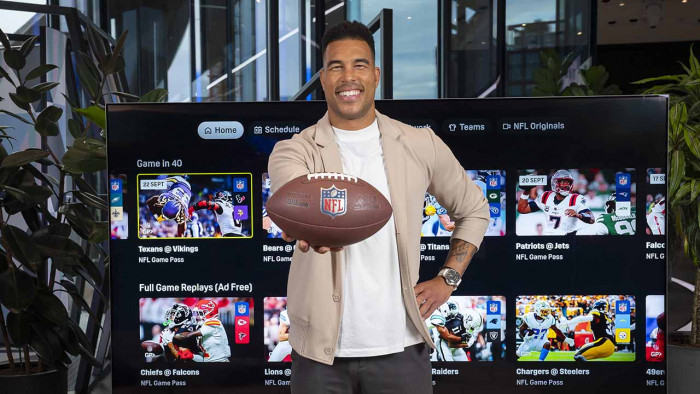Exclusive: Peter Crouch on mental health, life after football and his new charity initiative
64% of football fans struggle with mental health, and feel there is no-one they can talk to. Peter Crouch wants to change that.


It’s well documented how challenging it is to discuss mental health, being vulnerable and opening up to someone. To shine a light on the issue, mobile network Three has partnered with the charity Samaritans and Chelsea FC for a third year of the #TalkMoreThanFootball initiative. And they've brought a footballing hero along for the ride.
This year, Peter Crouch, who has often been incredibly open about his own mental health struggles, will help launch the campaign, which will provide a therapeutic taxi service from West Brompton Tube station to Stamford Bridge ahead of the Premier League clash between Chelsea and Spurs.
All of the drivers have been given the necessary training from Samaritans to help them discuss mental health worries with their passengers, whilst other drivers will be able to take an online course later this year so they can be ready to help, too.
The initiative comes off the back of research that continues to stress how pressing an issue mental health troubles are amongst football fans. A survey conducted as part of the initiative revealed that 64% of footie lovers say they have struggled with mental health, whilst almost half of them turn to an unlikely source of support in taxi drivers – I use my barber personally, but the stats certainly resonate. The research, talking to 2,000 football fans, found that 42% would rather chat with a driver than their pals because it would be a judgment-free zone.
We had the opportunity to discuss the initiative, mental health and more with the former Liverpool, Stoke and England striker. Here’s what top man Crouchy had to say.

This is a sensitive subject matter, and it's also important to you. How did you get involved with Three’s #TalkMoreThanFootball mental health initiative with Samaritans?
Peter Crouch: I just think I've done various things in the area before. I remember doing a team talk with Prince William. He's very much into mental health – especially with men as well – he has done various campaigns in the same kind of vein, and I think it's important.
Certainly, for men, there are quite a few issues with them, around not being able to talk. When I see Abbey [Peter’s wife], she's always talking to her friends, and any problems she's got, she's on the phone straight away.
I think we're very different, I would say, and football has that kind of stigma associated with it, where it's like ‘come on, just man up,’ you know? ‘You toughen up,’ that kind of thing. And I had that when I was young. But this is so much better.
Do you think it has improved from when you were playing?
PC: A million percent. It was an element of showing weakness if you talked about anything you were worried about or concerned about. But, I mean, it's been proven over the years now that it's much better when you share problems and talk to people closely.
You had a few challenging spells during your career. Could you have used a taxi ride during those moments?
PC: Yeah, definitely, what’s good when talking about, more than football is, sometimes, even with a taxi driver, it's quite nice having someone that's kind of not in your inner circle. Someone you can just kind of open up to without any judgment because they don't know you.
It's nice to be able to sit in the back of a cab and kind of speak to someone who's been trained by the Samaritans and is qualified enough to listen, and willing to listen as well. Because you do meet a lot of people in life where you just realise they're not even listening. They're looking past me. But you know, it's just that little journey [in a taxi] that can be a huge difference for someone who is struggling.
During those challenging periods of struggle, what would have been something you would have used as a distraction?
PC: I mean, listen, I've got better over the years. When I was, younger, I used to take it all on myself, you know, and I'll be very much insular, like I'd have my issues, and everyone on the outside would think that I'm really happy and fun, I would say, but on the inside, you're feeling it.
I think over the years, I've learned I'm a little bit more comfortable in my own skin now to be able to talk. Certainly, when I was younger, I found that really difficult.
We've also matured a little bit, you know. Unlike when I was younger, when you would take the mick, it’s calmed down a lot. It's not a sign of weakness to actually go to talk about something.
Why do you think it's easier to just chat with strangers?
PC: Sometimes I think there's no judgment, is there? And you know they're not going to tell anyone about how you're feeling. Quite often, you're just worried, aren't you, that when you talk to someone, they might tell someone else.
You sit in a taxi with someone you've not met, who's qualified to speak to you. That's a great place to be, because, you know, they're not going to tell anyone that you're close to, or, you're not going to feel threatened at work.
That's quite an issue as well. When you don't want to show any weakness, you've got a shield up around you. And when you speak to someone who's independent, someone to talk to that's not going to judge you, it helps.
One thing that stood out from the beginning of your career was that you had one standout feature, your height. How did you turn that from what was used to mock you at the beginning into your biggest strength?
PC: That kind of, at first it's like, why can't I just be like everyone else, you know? And obviously not many footballers look like me. So at first I was like, "argh, it's a nightmare", because you just want to fit in. Then, bizarrely, it kind of became my superpower. All of a sudden, I was different and proud of being different. I've changed people's opinion.
When they first saw me as a footballer, they probably didn't respect me, and then obviously saw me playing, and I ended up changing so many opinions, which gave me so much confidence.
Since finishing your career, was it a struggle changing people's perspective of you as a footballer, to 'this is Peter Crouch, a decent guy you can chat with and be entertained by'?
PC: Well, I mean, that's gone in my favour afterwards, but, you know, I've always been the same person all the way through. I think any of my teammates would say that. It’s just people seeing more of me now than they ever used to.
Back then, all I did was the pre-match or post-match interview; that was it. So I think I've always been the same person, but yeah, what I'm doing now is kind of, I suppose, just been born out of doing more.
Another thing I noticed from your early career was your use of humour to deflect and be more resilient. Was that intentional?
PC: That was true, yeah. It was almost like a force field that I put up because people always wanted to, certainly when I was younger, kind of take the piss. And I was like, 'if I, if I do it better, that stops'.
So I was quick to take the mick out of myself before anyone else could. It was kind of like a way of stopping it. That was something that I had to do. Something that made me a little bit more guarded, but that shaped me as a person. Everything happens for a reason, and it just shapes who you are in the end. And, you know, hopefully it's worked in my favour.
Is there an element of that with many young men to cover up genuine insecurity?
PC: I think so. Sometimes the most insecure people are the ones who are the loudest, the funniest, who try to deflect it or diffuse situations with humour. That's certainly something that I did, not so much now, but it was definitely an element of that.
One of the more challenging moments of your career was that penalty miss for Liverpool when you were on a drought. Let's say, after that game, you're jumping in one of these taxis, what are you saying to the driver?
PC: Genuinely, I would have loved to have gone home from that game in one of these taxis, because I just took all that on my shoulders and went home. I didn't want to leave the house because I had gone through this massive goal drought; I felt like I’d been ridiculed nationally, almost globally, really. Every time I turned on the TV, someone was criticising me. I had to stop buying newspapers, stop watching TV, and kind of go into a bubble.
That's not healthy for anyone, is it? So if I imagine driving home from that game and being in one of those taxis, even if it's a short journey, I could have just let it out. It would have been a lovely release, because I went home. I wasn't with Abbey then either, I didn't have any kids. I was living up north and from down south, so I didn't have anyone, I was just sitting there, stewing on it. And that's not healthy for anyone.
Football is a unique career path in that it’s not a career for life like most are. Was it difficult transitioning to something else whilst learning that your career was ending?
PC: Realising was a hard thing to take, because I've played football my whole life, I remember kicking a ball around when I was four or five, and then obviously going to professionally play every single day of your life from 16 to 38. That’s 22 years and that’s all I did.
So, I mean, it was a long career, but then you're like, you know, around kind of 32/33, I started thinking, ‘what's next?’ And then I was lucky. I just started doing things, and I threw myself into it. I did my coaching badges, I did a book, and I did my podcast. They kind of just took off, but I'd recommend to anyone playing to just do it while you're still playing, because that stood me in really good stead.
I kind of transitioned, pretty well, into doing something, but then, I know loads of friends who have struggled since they retired, like, really struggled. And, you know, it's funny. Obviously, I know everyone's well paid, and then it's like, bang, that stops. Well, I've got to go for another 40 years. Yeah, it's not as if you've put it all away.
The financial and purpose aspects of it are tough. How are you going to stimulate yourself every day? I know people who have struggled with that.
What advice would you give someone going through a significant life change, and maybe it's not working out the way they intended, or, like yourself, retirement is creeping up?
PC: Be positive but proactive about it. For me, it was retirement. But you know, for various things, even if you want to change jobs. It's never as scary as you make it out to be. Once you do it, you make a jump and you go for it. I would say that quite often, you’re better off, and it’s not as hard as you first anticipated.
Main image via Three / Gareth Copley/Getty Images
Latest


Slomo pop-up offers saunas and ice soaks in Kings Cross


Best gifts for runners that they'll actually want and use








